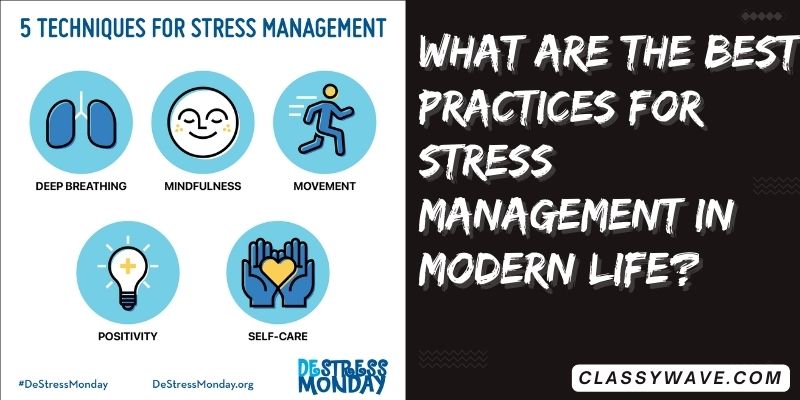What are the best practices for stress management in modern life?
Navigating the demands of modern life requires effective stress management. This guide explores diverse strategies, from stress relief tips and tech detox strategies to mindful living, work-life balance, and prioritizing physical well-being. These practices empower individuals to proactively address stressors and foster a more balanced and resilient approach to contemporary challenges.
Effective Stress Management
Effective stress management involves adopting strategies to cope with and reduce stress in various life situations. This encompasses a proactive approach, incorporating techniques that address the root causes of stress and promote overall well-being. By cultivating a toolkit of coping mechanisms, individuals can navigate the demands of modern life with resilience and maintain mental and emotional balance, fostering a healthier and more sustainable lifestyle.
Modern Stressors
Identifying modern stressors is crucial for effective stress management. These stressors include technological overwhelm, information overload, and fast-paced lifestyles. Understanding and acknowledging these contemporary challenges allows individuals to tailor stress management strategies to address specific sources of stress in the modern world. By recognizing and mitigating the impact of everyday stressors, individuals can cultivate a more adaptive and resilient approach to navigating daily life.
Mindfulness Practices
Mindfulness practices are powerful tools for stress management, involving intentionally focusing on the present moment without judgment. Meditation, deep breathing, and mindful awareness help individuals cultivate a calm and centered mindset. By incorporating mindfulness into daily routines, individuals can reduce stress, enhance self-awareness, and build mental resilience, ultimately fostering a more balanced and harmonious life.
Healthy Lifestyle Habits
Incorporating healthy lifestyle habits is fundamental for stress management. This includes regular exercise, balanced nutrition, and sufficient sleep. Physical well-being directly impacts mental resilience, and by prioritizing these habits, individuals create a strong foundation for coping with stress. A healthy lifestyle supports overall health and provides the necessary energy and resources to navigate the challenges of modern life with greater ease.
Workplace Stress Solutions
Workplace stress solutions involve adopting strategies to manage and mitigate stress professionally. This may include effective time management, setting boundaries, and promoting a supportive work culture. By addressing stressors in the workplace, individuals can enhance job satisfaction, reduce burnout, and cultivate a more positive and productive work environment, contributing to overall stress management in modern life.
Mind-Body Techniques
Mind-body techniques integrate mental and physical approaches to manage stress. These include practices like yoga, tai chi, and progressive muscle relaxation. By connecting the mind and body, individuals can release tension, promote relaxation, and enhance overall well-being. Combining mind-body techniques into daily routines offers holistic stress management, addressing mental and physical aspects for a comprehensive and effective approach.
Time Management Strategies
Effective time management is crucial for stress reduction. This involves prioritizing tasks, setting realistic goals, and creating efficient schedules. By optimizing time usage, individuals can reduce the pressure of overwhelming workloads and deadlines, fostering a sense of control and accomplishment. Implementing time management strategies contributes to a more organized and balanced approach to daily responsibilities.
Social Support for Stress
Social support is a vital component of stress management. Cultivating strong social connections and seeking support from friends, family, or colleagues provides an emotional buffer during challenging times. Sharing concerns, seeking advice, and receiving encouragement fosters a sense of belonging and resilience. A supportive network contributes to effective stress coping and promotes mental and emotional well-being.
Tech Detox for Mental Health
A tech detox for mental health involves intentional breaks from digital devices to alleviate the stress of constant connectivity. Limiting screen time, setting boundaries on device use, and engaging in offline activities promote mental rejuvenation. By disconnecting from technology periodically, individuals can reduce information overload and foster a healthier relationship with digital platforms, improving mental health in the modern era.
Daily Relaxation Techniques
Incorporating daily relaxation techniques into routines is essential for ongoing stress management. This may include deep breathing exercises, progressive muscle relaxation, or guided imagery. By dedicating time each day to intentional relaxation, individuals can release tension, promote a calm mindset, and build resilience against the cumulative effects of stress, fostering sustained mental and emotional well-being.
Stress Relief Tips
Stress relief tips encompass practical strategies for managing and alleviating stress. These can include simple techniques like deep breathing, taking short breaks, or practicing gratitude. By incorporating these tips into daily life, individuals can proactively address stressors, promoting a more relaxed and balanced mindset.
Tech Detox Strategies
Tech detox strategies involve intentional breaks from digital devices to reduce stress. Strategies include setting device-free time, limiting screen exposure, and engaging in offline activities. These practices help mitigate the impact of constant connectivity on mental well-being, fostering a healthier relationship with technology.
Mindful Living
Mindful living is a holistic approach that emphasizes present-moment awareness and non-judgmental observation. By incorporating mindfulness into daily activities, individuals enhance their ability to cope with stress. Practices such as meditation and mindful breathing promote a calm and centered mindset, fostering resilience in the face of modern stressors.
Work-Life Balance
Work-life balance involves prioritizing both professional and personal well-being. Strategies include setting boundaries, managing workload, and allocating time for leisure. By achieving a harmonious balance, individuals reduce the impact of workplace stressors, promoting overall mental and emotional equilibrium.
Physical Well-being
Physical well-being is a cornerstone of stress management. This includes regular exercise, a balanced diet, and sufficient sleep. Physical health directly influences mental resilience, providing the energy and resources to cope with stressors. Prioritizing physical well-being establishes a strong foundation for overall stress reduction and promotes a healthier lifestyle.
Conclusion
In conclusion, adopting these stress management strategies equips individuals with a versatile toolkit to navigate the complexities of modern life. Individuals can create a resilient and harmonious lifestyle by embracing stress relief tips, integrating tech detox strategies, fostering mindful living, balancing work and life, and prioritizing physical well-being. These practices contribute to an enduring sense of well-being, empowering individuals to thrive amidst the demands of today’s fast-paced world.
FAQs
Question: How can I quickly relieve stress in daily life?
Answer: Try deep breathing, take short breaks, practice gratitude, or engage in a favorite hobby for immediate stress relief.
Question: What are effective strategies for a tech detox?
Answer: Set device-free times, limit screen exposure, and immerse in offline activities to achieve a tech detox.
Question: How does mindful living help in stress management?
Answer: Mindful living, with practices like meditation, enhances present-moment awareness, reducing stress and promoting resilience.







